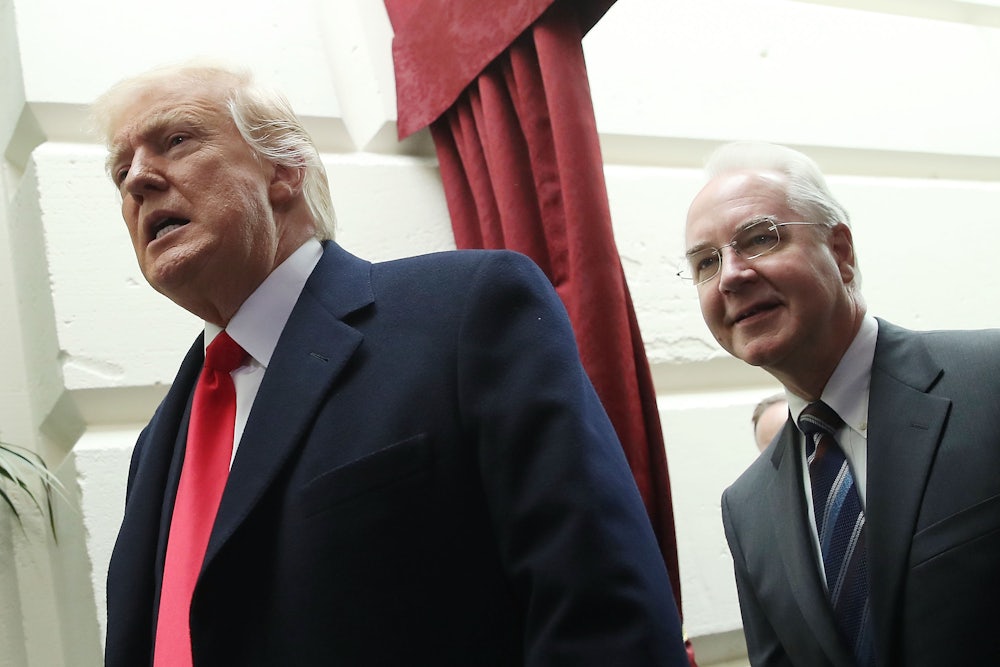The abrupt failure of the GOP effort to repeal Obamacare, after months of halting progress, confronts Republicans with a basic choice between decency and nihilism: Will bitter partisanship and ideological inflexibility drive them to use the levers of government to vandalize the health care system, now fully under their control? Or will they reluctantly engage in bare-minimal governing and bring basic stability back to health insurance markets?
The party’s conduct throughout the Obama years, and in the face of Donald Trump’s rise to power, should leave nobody confused as to which course they are likely to take. But there is at least some hope that cooler heads will prevail in the party, if only out of sheer self-preservation.
The failure of Trumpcare tells us something very valuable: There are at least 51 votes in the Senate for the proposition that sabotaging the health insurance system is bad—that however imperfect the Affordable Care Act’s reforms were, we shouldn’t go back to the vicious status quo ante of underwriting, rescission, annual and lifetime limits, adverse selection, and discrimination against the sick.
What it doesn’t tell us, but what we’ll soon find out, is whether there are large majorities in Congress—and enough political will within the GOP leadership—to take modest legislative steps that would improve and stabilize the system, and leave partisan health care battles that have dominated politics for eight years in abeyance.
Does that sound likely? No it does not.
The health care debate now transitions into a new phase, dividing a small faction of the GOP that would like to be cooperative from a larger faction of indifferent or malicious Republicans who will happily let the president seek revenge by harming the public.
Because the ACA was proffered as a compromise between ideological liberals and conservatives, it isn’t particularly simple in design, and its complexity makes it vulnerable to sabotage. Indeed, Trump and his Health and Human Services secretary, Tom Price, have made no secret of their willingness to undermine the law they’re sworn to execute faithfully. Those efforts have been underway all along, and before Senate Majority Leader Mitch McConnell’s eyes had dried early Friday morning, in the wake of his failed repeal vote, Trump was predictably telecasting his low-cunning intentions.
3 Republicans and 48 Democrats let the American people down. As I said from the beginning, let ObamaCare implode, then deal. Watch!
— Donald J. Trump (@realDonaldTrump) July 28, 2017
Supporters of the Affordable Care Act, and of the basic idea that government should work for the public, cannot underestimate how live the threat to millions of people’s health care remains. “If they want to tank these markets, they certainly can,” Nicholas Bagley, a health law expert at the University of Michigan, told me.
The simplest and crudest way for Republicans to collapse the ACA marketplaces would be for the Trump administration to halt payments the government owes to insurers who cover low-income people, and for the Republican Congress to decide not to force Trump to make the cost-sharing reduction transfers by law.
But even if we assume Trump and the GOP don’t want to be caught inflicting harm so brazenly, there is no shortage of ways for them to stoke dysfunction until the markets are tattered and shrunken. “The biggest risk, to my mind, isn’t a discrete thing that the administration might do,” Bagley said. “It’s all the discrete things it might not do.” He added:
Making the exchanges work, for just one example among dozens, requires an IT infrastructure that allows exchanges to communicate quickly and seamlessly with IRS databases. If that infrastructure breaks down and no one is staffed to fix it, what happens then? The degree of coordination that’s required between the federal government and the exchanges is so intense that an absent federal partner will create serious operational problems. The exchanges could grind to a halt like a rusting factory.
For HealthCare.gov, the problem is even more acute since the agency has to administer the website on a day-to-day basis. What if it decides to allocate its resources elsewhere, even in the face of a meltdown like the website faced in its early days?
These exchanges can’t run on autopilot. They’re complicated entities, and they need effective, competent, and reliable day-to-day management.
It isn’t hard to dream up different kinds of mischief. Imagine if Price insisted that subsidy-discounted prices not appear on the healthcare.gov browsing screen, making people believe they’re on the hook for the full cost of their premiums? Or if you don’t want to imagine, take a look at what Price has already done. As The Daily Beast’s Sam Stein reported last week, the administration has spent taxpayer money intended to boost ACA enrollment on anti-ACA propaganda efforts.
This particular scheme may be unlawful, and as The Washington Post’s Greg Sargent notes, it has caught the attention of the auditors at Government Accountability Office. But not every act of mismanagement will be illegal. It’s legal not to advertise open enrollment periods. It’s legal to be a poor partner to wavering health insurers. It’s probably legal to weaken enforcement of the mandate. Because Republicans control the knobs and cranks of this Rube Goldberg device, they can cause it to break in ways that activists will have a hard time spotting, and a harder time undoing.
Here, the glaring contrast to the Medicaid expansion—simple and straightforward—should serve as a lesson to both Democrats and Republicans. However badly Republicans botch the administration of Obamacare, there’s little they can do to stop Medicaid expansion from helping and satisfying its beneficiaries. The lesson there surely will be taken into account if and when the Democrats return to power, and Republicans bequeath them a private insurance market in shambles.
